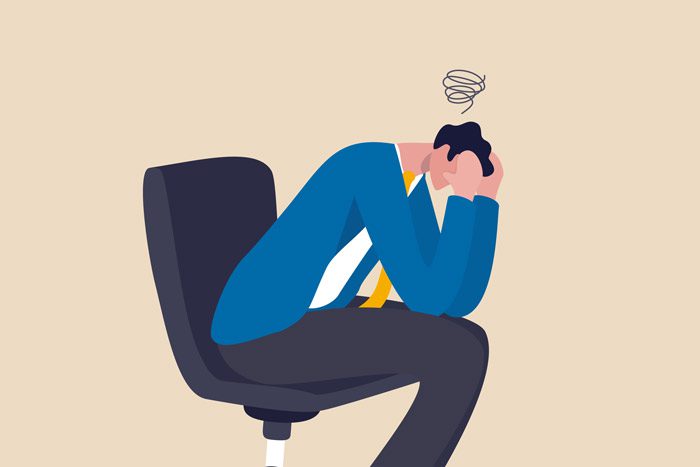Dealing With Life
 When your life no longer centers around substance abuse, you start to realize how frustrating day-to-day life can be. For example:
When your life no longer centers around substance abuse, you start to realize how frustrating day-to-day life can be. For example:
- Having someone butt in front of you in the checkout line when you’re in a hurry to leave the store
- Working with a coworker who tries to take credit for your ideas
- Having a friend cancel plans at the last minute
- Trying a new recipe for dinner but accidentally burning the meal
Feelings of frustration are a normal response when you’re faced with circumstances that are seemingly beyond your control. Unfortunately, frustration can put you at risk of relapse if you don’t have strong coping mechanisms in place.
Why Frustration Is Often a Problem for People With Substance Use Disorders
Have you ever noticed that some people seem to never be phased by challenges, but others struggle to keep their emotions in check when they are faced with frustrating circumstances? People who have problems managing their frustration are said to have a low frustration tolerance (LFT).
First developed by psychologist Albert Ellis, the concept of LFT is associated with rational emotive behavior therapy (REBT)—a framework that states all people have both rational and irrational tendencies. You may recognize REBT from its use in the SMART Recovery peer support program for people who are suffering from substance use disorders.
People with a low frustration tolerance often:
- Postpone tasks they find boring or difficult
- Avoid tasks that are challenging
- Are easily overwhelmed
- Try to “fix” problems that would eventually resolve themselves because they are impatient
- Focus on short-term pleasure instead of long-term success
- Get irritable and angry when things don’t go their way
- Lash out at those who they view as causing their frustration
- Believe that life is fundamentally unfair
- People from all different types of backgrounds can struggle with low frustration tolerance. However, LFT is common among those who have substance use disorders as well as conditions such as depression, anxiety, and ADHD.
Sources of Frustration in Recovery
A low frustration tolerance can make day-to-day tasks difficult, but it’s particularly problematic in recovery. No matter how committed you are to your sobriety, there will be times when things don’t go your way. Sources of frustration in recovery may include:
- Strained relationships with family and friends
- Legal issues related to drug possession or drunk driving charges
- Ongoing financial problems related to poor money management while you were using
- Cravings that are hard to manage
- People who unfairly stigmatize substance use disorders
These are all temporary setbacks, but they can be blown out of proportion when you’re already feeling overwhelmed by day-to-day sources of frustration. This can lead to self-doubt that may jeopardize all the hard work you’ve already put in on your journey to self-improvement.
Healthy Ways to Cope With Frustration
In the past, you may have turned to drugs and alcohol when you were frustrated with work, family, or friends. Now, you’ll need to come up with healthy ways to keep your emotions from getting the best of you.
Here are some tips to help improve your frustration tolerance:
- Realize that some situations can’t be changed. When you’re frustrated, ask yourself if there are any reasonable steps you can take to change your situation. For example, maybe taking a different route to work or leaving earlier would alleviate the stress caused by heavy traffic. If the situation can’t be changed, however, you need to focus on simply accepting that frustration is sometimes a part of life.
- Practice deep breathing or meditation. The racing heart rate, rapid breathing, and muscle tension we associate with feelings of frustration can be relieved with deep breathing exercises or 10-15 minutes of meditation. Try different approaches to see what works best for you, then remember to put these strategies to work as soon as your frustration starts to get the best of you.
- Take a short break. If it’s possible to do so, try removing yourself from the situation. Coming back with a clear head can help you maintain a more balanced perspective.
- Remind yourself of your resilience. You have already accomplished a great deal by getting this far in your recovery journey. You are capable of overcoming obstacles and tackling challenges, even when you feel overwhelmed.
- Challenge yourself in a safe environment. Tasks that are mildly frustrating, such as putting together a puzzle or playing a new video game, let you work on gradually increasing your frustration tolerance. As you learn to control your temper in a low-risk environment, you’ll find it easier to keep your cool when the stakes are higher.
Waypoint Is Ready to Help
Waypoint Recovery Center’s South Carolina residential drug and alcohol treatment program focuses on helping clients build the foundation for a lasting recovery—which includes finding ways to manage frustration without turning to addictive substances. No matter where you are in your recovery journey, we’re here to help.





